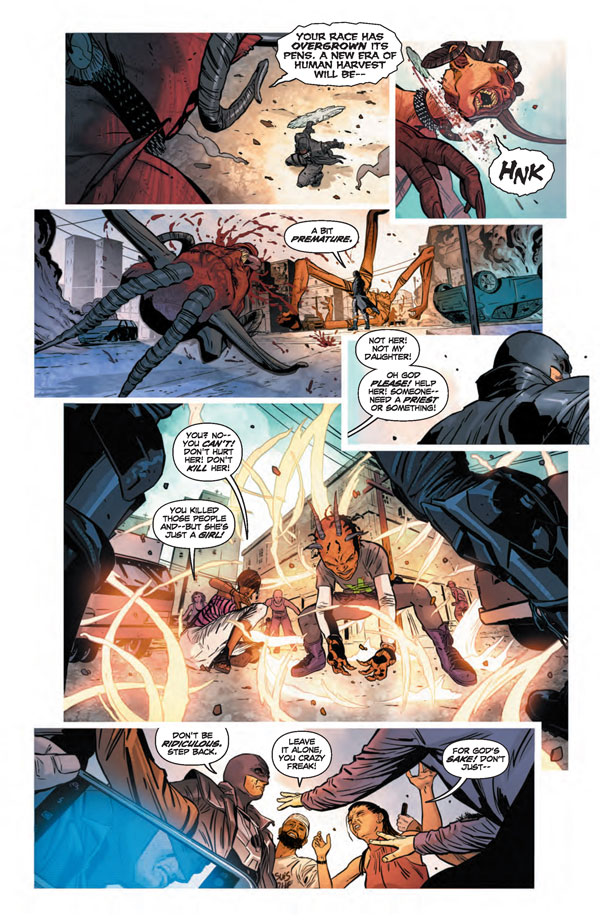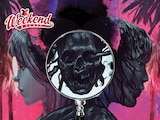
MIDNIGHTER #1, which kicks off the black-clad, openly gay vigilante’s first ongoing solo comic in five years, launches this week. Earlier this year, we spoke with writer Steve Orlando about this eagerly awaited new comic. Here’s what he had to say.
The prospect of the Midnighter solo comic is so interesting and exciting. I’m curious, what are you most excited about, personally, when it comes to writing Midnighter?
I’m most excited about the character’s unique blend and style—all of those proto-masculine, John McClane-esque traits, applied to a character that is unabashedly gay. I think that’s what makes him unique. When I was thirteen, that was what was appealing about the character for me. There is no one way to be LGBT. There is no one way to be queer. He can do all these things and command this respect, without having to shield any part of his life. The character is out of the closet in every way—there is no hiding that he is a super hero and there is no hiding that he is a gay man. I think that’s something that is pretty powerful and unique about the character.
Midnighter isn’t the first gay hero to anchor his own ongoing title, but I think he’s the first that I would put in the category of definitely not a role model. How important is it to have that sort of spectrum when we’re talking about gay heroes and gay characters in media in general?
Well, I think it’s kind of loaded to say that he is not a role model. He certainly has his issues, but I think the core confidence of the character is definitely something that is admirable. A lot of the problems in his life and his struggles stem from himself, so, yes, he is not a role model in some ways. He is very into violent citizen’s arrests—but his approach to life is something that I think is admirable and that hopefully will resonate with a lot of people. The idea that he is 100% himself all the time and really shows no fear in the face of a public that maybe isn’t behind his decisions, regardless of if he is in or out of his costume.
But at the same time, I think it is important to say that this is really just a story about one man. The book is about one character. Obviously, there’s always this notion that doing a queer book, you’re representing the entire community and I think that’s kind of an unfair assumption. Midnighter is the story about one guy who is extremely flawed. Much like anyone else, he does good things, and there are things that people will like about him, but there are things that people may find unsavory about him as well. But you know, that is the hero of the 2015 audience. You have a readership that now prefers to read about Jaime Lannister than Ned Stark, and he’s much more unlikable than Midnighter, yet here we are with people rooting for him. I think the journey of taking this character that has all these problems and showing him evolve as a person, for readers, is actually just as important as him starting off as an idealized character.

Where is Midnighter when we meet up with him? He’s shown up in Grayson lately. Do those appearances lead up to this or is it a completely fresh start for him?
Well, it’s a fresh start, but I think that it does lead out of Grayson. You saw his final page in GRAYSON #7. He’s walking out of the God Garden, and that’s basically his mom. So he needs a fresh start, because he just walked out on the only thing that was giving him structure in his life. He’s lost his entire support group. As we open up the book, Midnighter has no secret identity. He is out of the closet as a gay man. He is out of the closet as a super hero, and he is trying to figure out what that means. Part of that is getting back to who he was in the beginning. Getting back to the roots of the character, which are helping real people and affecting change that he can see, as opposed to getting lost in these big idea fights. Super villain fisticuffs almost don’t interest him, as much as like, seeing a woman who has gotten her groceries stolen and taking that guy and putting him into a manhole. He wants to see real people and improve their lives.
I always like to say about the character, it’s caring by the way of sadism. He has an enormous amount of empathy, but the way that he expresses it is by this extreme rage he has when people hurt other people.
How dark and gritty and violent is this book going be? Are you pushing the boundaries?
We are going to be pushing the boundaries but, I don’t know—what are the boundaries? We’ll have our own brand of ridiculous hyper violence along with social exploration as he tries to see who he is out of costume. It’s not going to be the normal mix of things you see in a book, which hopefully will make it unique and people will gravitate towards it. There is so much of the character that is contradictory. I think that makes him unique.

Will Apollo be in this comic? Is that relationship intact?
They’ve been on the rocks in Grayson and they were on the rocks in Stormwatch, and all I will say about that is that I think that their relationship is a kick off point and a driving force of the series, whether or not they are together. The feeling and the specter of that relationship is going to be there, regardless of if Apollo is physically there or not. They’ve been together on and off, basically exclusively since they came out of the closet. I think that happens with real people. It happens in real relationships. You realize that you don’t know how to define yourself as an adult without this other person and that’s not healthy. It’s something that anyone faces. He has decided he’s going to be Midnighter all the time, but he doesn’t even know what that means. Midnighter doesn’t know if he likes to play pool. He doesn’t know if he likes bagels. He doesn’t know anything besides that he knows how to fight, and we have to solve that.
When you look at all of these other new and returning comics coming out with Midnighter, it’s a diverse slate that’s relevant to a bunch of different audiences. How important do you think it is for people to be able to have super heroes that resonate with them?
I think it’s super important. Comics are, and always have been, wish fulfillment. They’ve been escapism, but the face of American society and the face of the global society, is changing. It’s exciting for comics to be able to change with them. It’s important to be able to do that for new groups of people because that is how pop culture, which comics are a big part of, really helps you when you’re younger. “That person is crazy and amazing and he has this amazing life, but really, he’s just like me.”
The face of the people needing that has changed, so it’s about time that comics is trying to change as well.
MIDNIGHTER #1 by Steve Orlando and Aco will be available in print and as a digital download this Wednesday.




















